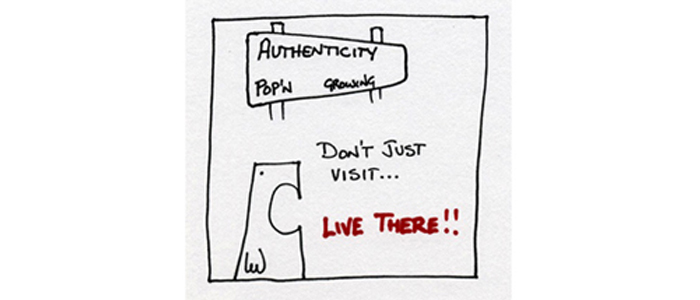Leadership is difficult work, and it can be easy to stray from who we are at the core in order to satisfy business imperatives.
Being totally authentic may present particular challenges in today’s highly competitive environments where, for example, proprietary knowledge needs to be closely guarded, or where news of impending lay-offs needs to be managed in order to avoid losing key staff.
We can be unwittingly mired in politics. We sometimes find ourselves in situations where we need to look over our shoulders continuously to protect ourselves. We cannot always trust that others are genuine with us. Even when we strive to do our very best, others will sometimes betray us. Much happens in the course of our careers as we climb the achievement ladder. We can sometimes, slowly and imperceptibly, wander off from our authentic selves. Despite all of this, we need to make every effort to stay true to who we are. As Howard Thurman eloquently said, “Find the grain in your own wood.”
Here are 10 ways of demonstrating your leadership authenticity:
- Living your values as a leader every day is an important key component of authentic leadership. However, you need to examine these values periodically to consider their validity in today’s environment. Work-life balance, for example, is no longer a perk – it may be an essential requirement for attracting the best minds to your organisation.
- Are you in the habit of making hasty promises that you know from past experience you are unable to keep? Think back on what promises you made, to whom, and see if you can fulfil some of these.
- There is a real freedom when we shed all affectation. Are there times in your life when you see yourself being forced to put on a show to make an impression on others? Resolve to stop that, once and for all. Watch yourself soar when you are unencumbered by the weight of pretense. Tell yourself, “I am enough” – and mean it.
- Straight talk, self-confidence and simplicity – these are the building blocks of substance; the triumph over image. Think about how you can make these a daily habit.
- Are there areas in your life where you might lack consistency without intending to? For example, are you kind to some people, but not to others? Are you completely truthful in some circumstances, but not in others? What does this insight tell you?
- Start collecting personal stories that you can use to illustrate to others important aspects of your leadership style, such as, what motivates you to lead; what your philosophy of leading is; and who you are as a person. Personal stories are the most effective form of storytelling for leaders.
- Adversity reveals our true character. Consider your conduct when things go wrong. Remind yourself that, as a leader, you are continuously under a looking glass. People want to be inspired by you.
- When you are given a script you didn’t write for a presentation that you have to deliver, spend extra time to make the words your own. Purge your presentations of inadvertently inflated language, which often ends with others questioning your authenticity as a speaker. For example, replace the words ‘eating establishments’ with ‘restaurants’, ‘learning environments’ with ‘schools’ or ‘universities’, ‘expeditious’ with ‘efficient.’ Take inspiration from Winston Churchill, who said, “Speak in short, homely words of common usage.”
- Are you forced to live in disharmony between who you are and what you do? Have you turned a deaf ear to the whispers of your heart? Resolve today to take action to start the journey back to finding yourself, to reconnecting with your passions and values. If this is not possible for you because of restrictions in your current circumstance, think about small compromises that you can start making right now to be more in a state of harmony.
- If you are a new leader, comfortable with seeking approval before making any decisions, develop a plan to start practising self-reliance. Start with smaller-scale decisions, and then progressively move on to more significant ones. Only when you free yourself from the need to have others’ approval can you truly start to evolve into the authentic leader you were meant to be.
With thanks to Bruno Martinuzzi for inspiration for this post.
